Master Workday Training in Hyderabad’s Leading Experts
Workday Finance Training in Hyderabad
Understanding Workday Finance: Account Control Rule Sets
At Workday Finance, accounting efficiency is of utmost importance.
Account control rule sets are used to manage this.
For instance, imagine working on the Cash ledger account, where any transaction exceeding $15 million requires prior approval, providing financial accuracy and accountability with Workday Finance.
Operational Rules in Workday Finance
Workday Finance’s operational rules and management rules serve to guide accounting.
Revenue posting rules outline which ledger accounts should be used for recording income.
Workday processes these rules from top to bottom to ensure alignment with any conditions set by customers.
Revenue Posting Rules in Workday Finance
Workday Finance’s revenue posting rules establish ledger accounts used for recording income.
When creating customer invoices, Workday Finance training in Hyderabad ensures that professionals understand how Workday Finance evaluates conditions sequentially before defaulting to one of several predefined ledger accounts if none of the conditions are met.
This method increases speed and accuracy while showing its efficiency.
Defining Categories and Rules using Workday Finance
Workday Finance allows you to categorise operational connections, such as asset sales, donations, and cash transactions, into distinct operational groups.
Revenue categories are defined within our accounts to streamline financial operations, ensuring proper allocation and adherence to business rules.
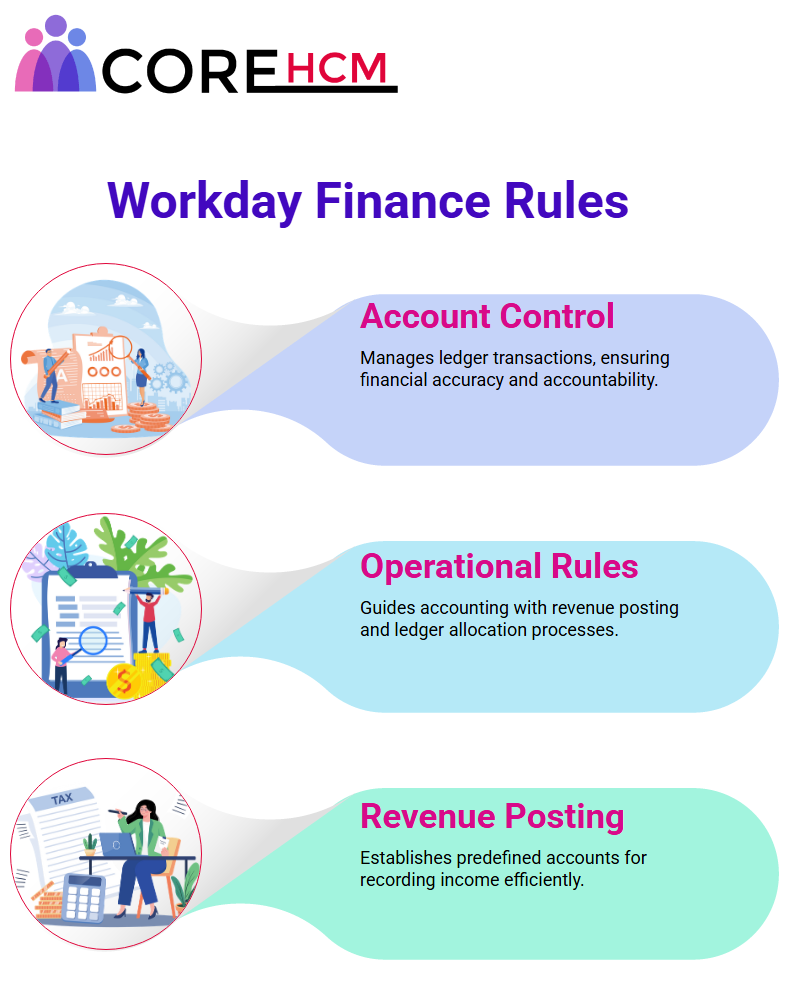
Simplifying Financial Processes with Workday Finance
Workday Finance streamlines financial workflows by providing an intuitive framework for creating account controls and posting rule sets, as well as operational categories and income rules, to organise and manage processes efficiently.
Understanding Workday Finance: Default Ledger Accounts
Have you ever wondered how Workday Finance handles situations where the default ledger account is missing?
To explain it: if this occurs, journal entries placed in an errors bucket are assigned to this error group for correct processing in Workday Finance.
Workday Finance training in Hyderabad equips professionals with the expertise to effectively handle error resolution when running the ‘Fix Operational Journals with Errors’ task in Workday Finance.
Workday Finance: Journal Reversal Options
Reversing journals in Workday Finance is a key feature that provides various options for managing entries.
The first option, Reverse Debits and Credits, allows users to switch debit and credit amounts without impacting ledger accounts.
For instance, if your original transaction debited $1,000 but credited $2,000, then inverting this could result in a credit of $2,000 and a debit of $1,000, thus equalising out its balance.
Workday Finance ensures that these options, through Workday Finance training in Hyderabad, are flexible enough to be tailored specifically to you, so that you and your needs are met.
Reversing signed values, on the other hand, preserves ledger accounts but inverts their signs, using brackets as indicators of what these options offer in terms of flexibility, explicitly tailored to your requirements and needs.
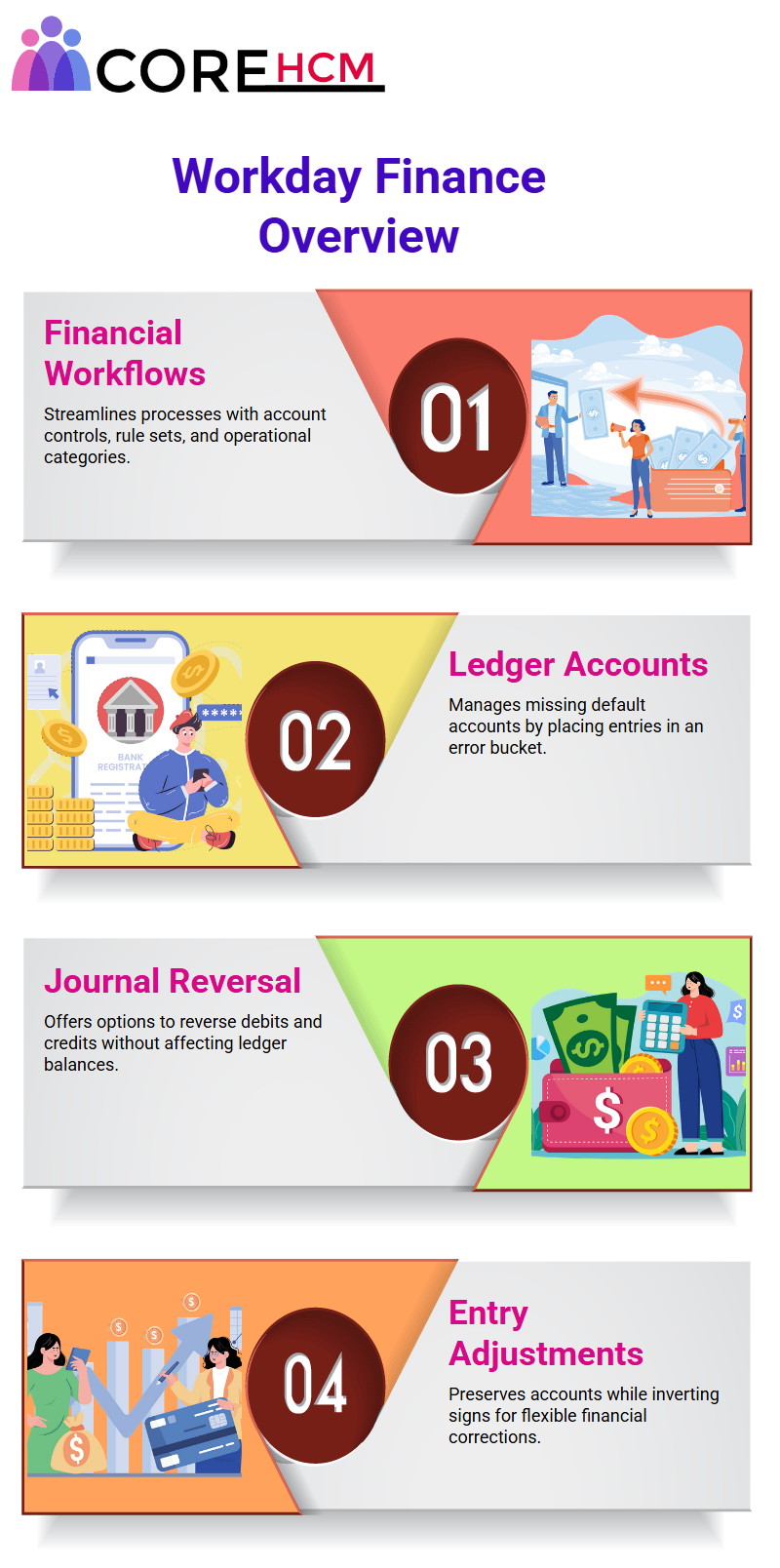
Setting Up Taxes in Workday Finance
Workday Finance streamlines tax setting for compliance and accuracy by providing an intuitive method for defining tax details, such as specifying values like ‘10,999’ for commonly used suppliers.
While setting up taxes may appear daunting at first, Workday Finance offers an intuitive method for creating and managing taxes, ensuring smooth operations.
Creating Ledgers in Workday Finance
With Workday Finance training in Hyderabad, users gain the skills to optimise ledger creation, ensuring accuracy and efficiency in Workday Finance.
Select your company and link your ledger to actuals.
Advanced features, such as budgets and obligations, can be bypassed if basic setups are your goal.
Workday simplifies this process, making it accessible even without extensive accounting knowledge. Its purpose is to ease financial management for you.
Workday Finance Opening Ledger Periods
Workday Finance makes managing ledger periods an essential aspect of smooth transitions, and Workday Finance training in Hyderabad helps professionals master this process effectively.
One practical approach for doing so is to use the Ledger Period Status task.
However, for practice purposes, it would likely be more effective to open all periods simultaneously. In real life, however, only certain ones would likely open as needed.

Creating Accounting Journals in Workday Finance
Workday Finance streamlines the creation of accounting journals with ease.
Start by customising Workday Finance’s default business process definitions.
These can also be tailored for different companies if desired.
Then, proceed with steps A through Z in alphabetical order, noting that multiple steps may exist at any one step, such as steps B1 through B9.
Business Process Management in Workday Finance
Workday Finance’s Business Process feature enables the flexible and straightforward definition of workflows for reviews and approvals by creating workflow definitions with just the click of a button, often abbreviated as “BP.”
Whether creating processes for a single company hierarchy or multiple entities, Workday Finance training in Hyderabad equips professionals with the expertise to navigate these complexities effectively, ensuring that Workday Finance has you covered.
Intuitively, you can link or copy business process definitions for customisation purposes.
Understanding Workday Finance: Simplifying Business Processes
Workday Finance enables the easy use and adaptation of business processes across company levels, including setting them up for specific company setups, such as Cross Delivery.
Mark each step completed before moving ahead to the next one.
Workday Finance prioritises access control, and Workday Finance training in Hyderabad helps professionals understand how to define security group restrictions to ensure business processes work efficiently.
By clicking the Initiation Step, you will find over 21 Security Groups that can perform this task.
However, if fewer people need access, modify the Business Process Policy instead.
Workday Finance enables users to create custom, valid actions or conditions for specific steps, such as adding or removing security groups, with ease and efficiency, and Workday Finance training in Hyderabad helps professionals master these configurations effectively.
With Workday’s customisable options, you can tailor processes to your accounting requirements as efficiently as possible and adapt processes efficiently according to individual business needs.
Reviewing your journal entries in Workday Finance is another key step, with review privileges set based on specific security groups.
Whether initiated by banks or another entity, this step ensures clarity and accountability for both.
Workday Finance makes tracking and reviewing processes seamless, giving visibility into who initiated, reviewed or approved the process at each step.
Access levels may also be granted selectively for completed steps, enabling implementers to manage approvals efficiently.
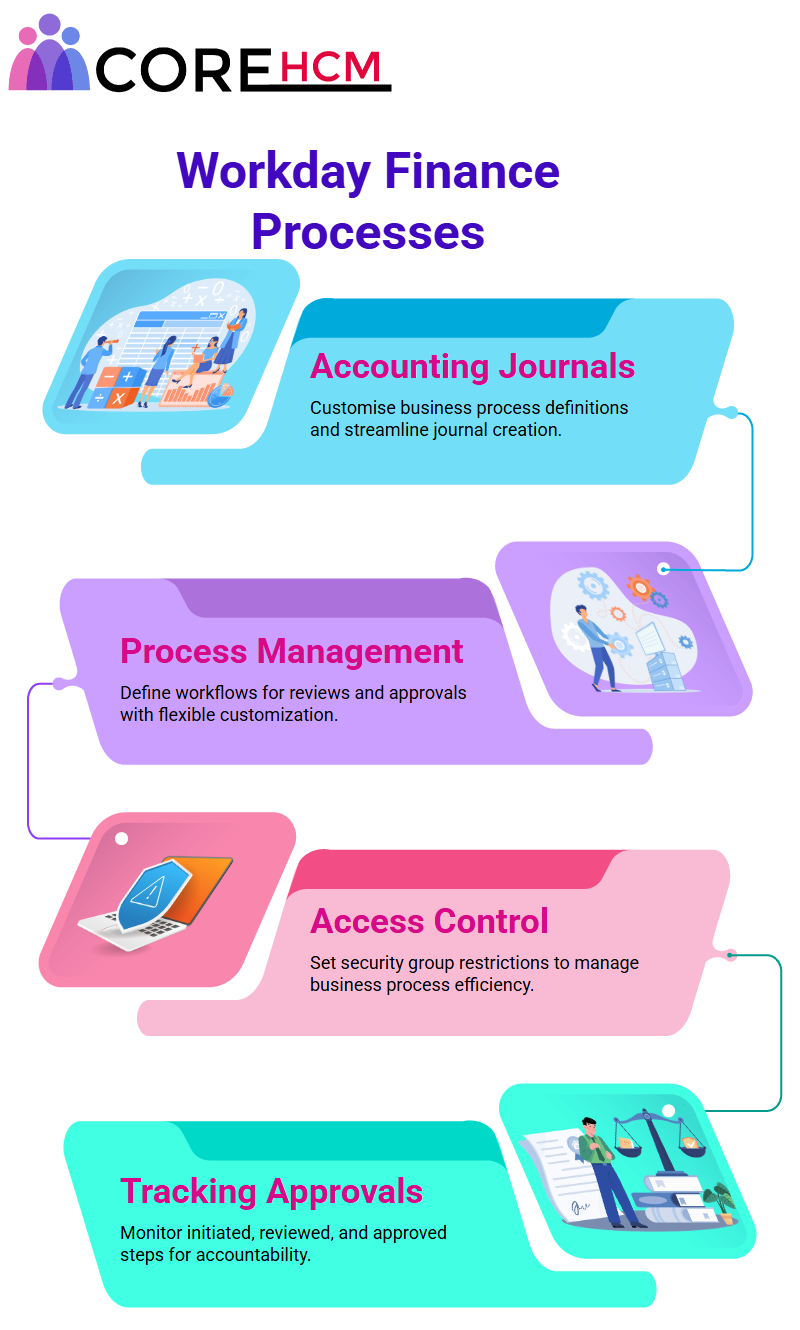
Workday Finance Managing Security Policies and Domains
Workday Finance excels at effectively administering security policies.
Whenever there are changes to a business process, random security policy updates should be implemented, ensuring operations remain safe while remaining adaptable.
Workday Finance excels in domains, which are collections of tasks and reports that require specific access permissions to function correctly.
Adding or removing security groups within domains allows you to tailor access specifically to your business needs.
Workday Finance’s flexibility enables task reassignment when required, meaning that if someone responsible for approvals becomes unavailable, they can delegate this task to someone at either an equivalent or higher level, helping to ensure the workflow remains unimpeded even under challenging conditions.
Workday Finance makes handling assignment tasks a simple experience, and Workday Finance training in Hyderabad helps professionals master this process efficiently.
While you may feel intimidated at first, over time, reassigning tasks and managing access becomes second nature.
Workday Finance Security Policies
Workday Finance security policies offer various requirements.
First and foremost, it is essential to be in the appropriate security group.
Furthermore, its security policy has been updated to include timestamping, allowing for the tracking of events as they occur at specific moments.
Workday Finance training in Hyderabad helps professionals understand these critical transitions, ensuring accuracy and security.
Changes have already taken effect, and Workday Finance requires you to focus on this step to ensure everything remains safe and in place.

Workday Finance and Journal Creation
Establishing journals in Workday Finance might seem complicated at first, but the process of defining access, reviewing content and creating journals can be completed successfully.
We reviewed any access issues before adding necessary content and worked towards merging security groups to ensure smooth operations.
Workday Finance makes creating journal sources an exciting yet complex endeavour, providing examples such as bank credits and costs to demonstrate its capabilities in managing journal entries, while simultaneously streamlining accounting processes.
Workday Finance Cost Centres Explained
Workday Finance utilises cost centres as an integral element in its financial tracking capabilities, with multiple cost centres created, such as payroll, IT infrastructure and operations, ensuring they’re efficiently organised for maximum financial tracking efficiency.
Why Workday Finance Ledgers Matter?
Workday Finance’s ledgers are similar to books in that all entries are recorded therein.
Ledgers enable businesses to record sales, payments, and financial activities, and Workday Finance provides options for selecting company ledger types tailored to meet their operational needs.
Troubleshooting Workday Finance Processes
Workday Finance enables businesses to streamline operations effectively while resolving issues efficiently through journal entries or fixed BP configurations, providing a streamlined approach to swift issue resolution.
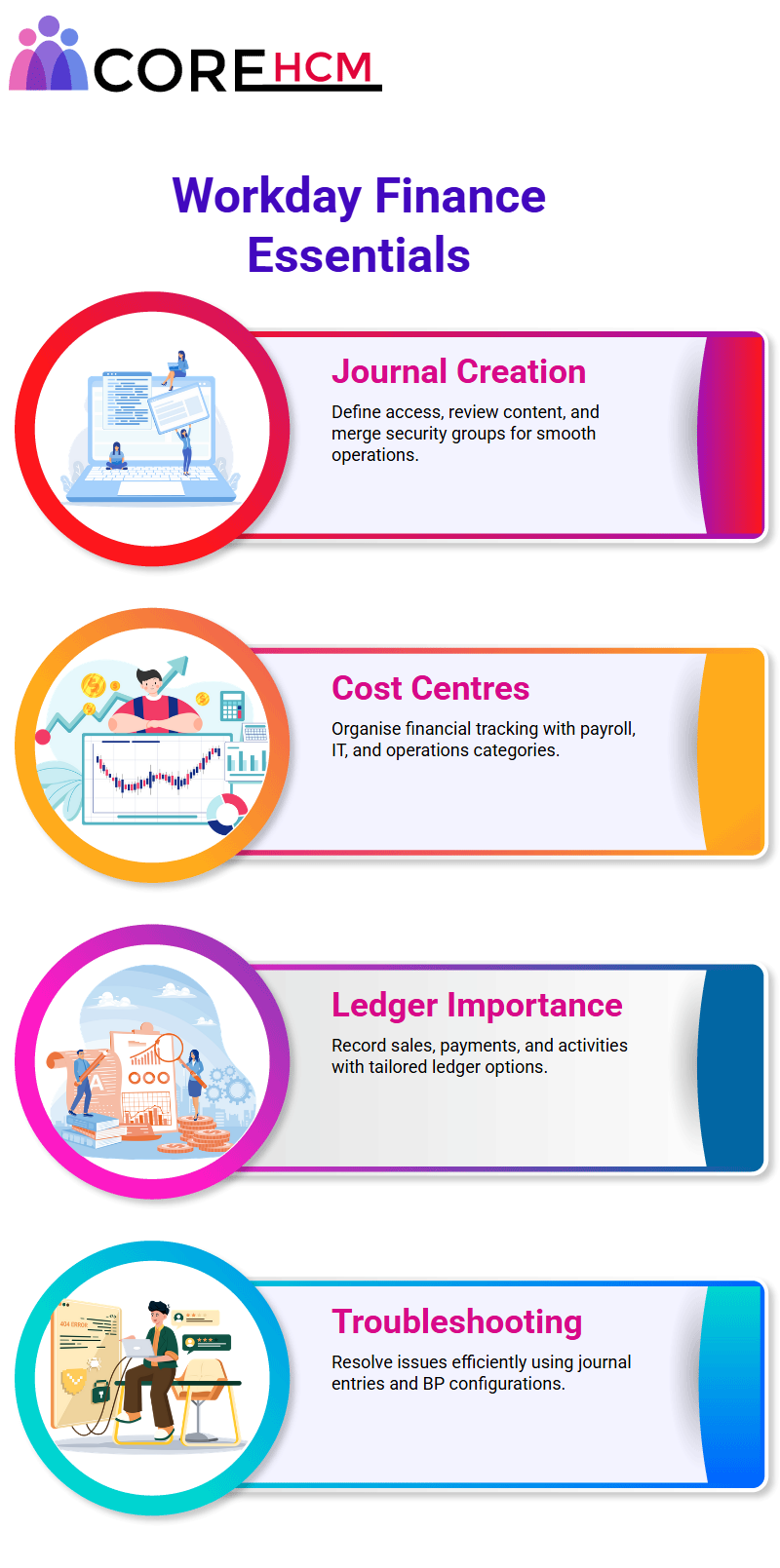
Exploring Workday Finance
Discover how accounting journals, professional records and financial controls integrate seamlessly in Workday Finance.
Have you ever considered how Workday Finance manages accounting?
Utilising two approaches, operational rules and management controls, ensures accuracy whether working on monthly adjustments or balancing ledger accounts.
Having Account Control Rules in Workday Finance
Imagine managing an account called Cash with an approval threshold of $15 million.
Any time someone attempts a transaction exceeding $ 15,000, an approval process will automatically initiate.
By leveraging Workday Finance training in Hyderabad, users can confidently navigate and optimise control processes within Workday Finance.
By setting thresholds and creating rules to enforce your standards on every transaction, Workday Finance provides you with power and peace of mind.
Account Posting Rules in Workday Finance
Setting posting rules ensures transactions fall into predefined categories, such as revenue or asset disposal, much like having an assistant who never makes mistakes.
Imagine creating customer invoices in Workday Finance and watching it automatically identify which ledger account corresponds to them, whether for income or cash transactions, Workday knows just where to post everything.
Discovering Operational Categories in Workday Finance
Have you seen Workday Finance’s operational categories?
From business asset accountability to delegation commitments, these categories serve as an operating manual for your finances.
It’s like having access to an infallible blueprint.
Workday Finance categorises gains and losses precisely during asset disposal transactions, and Workday Finance training in Hyderabad helps professionals understand this process, making it an integral component of the workflow.
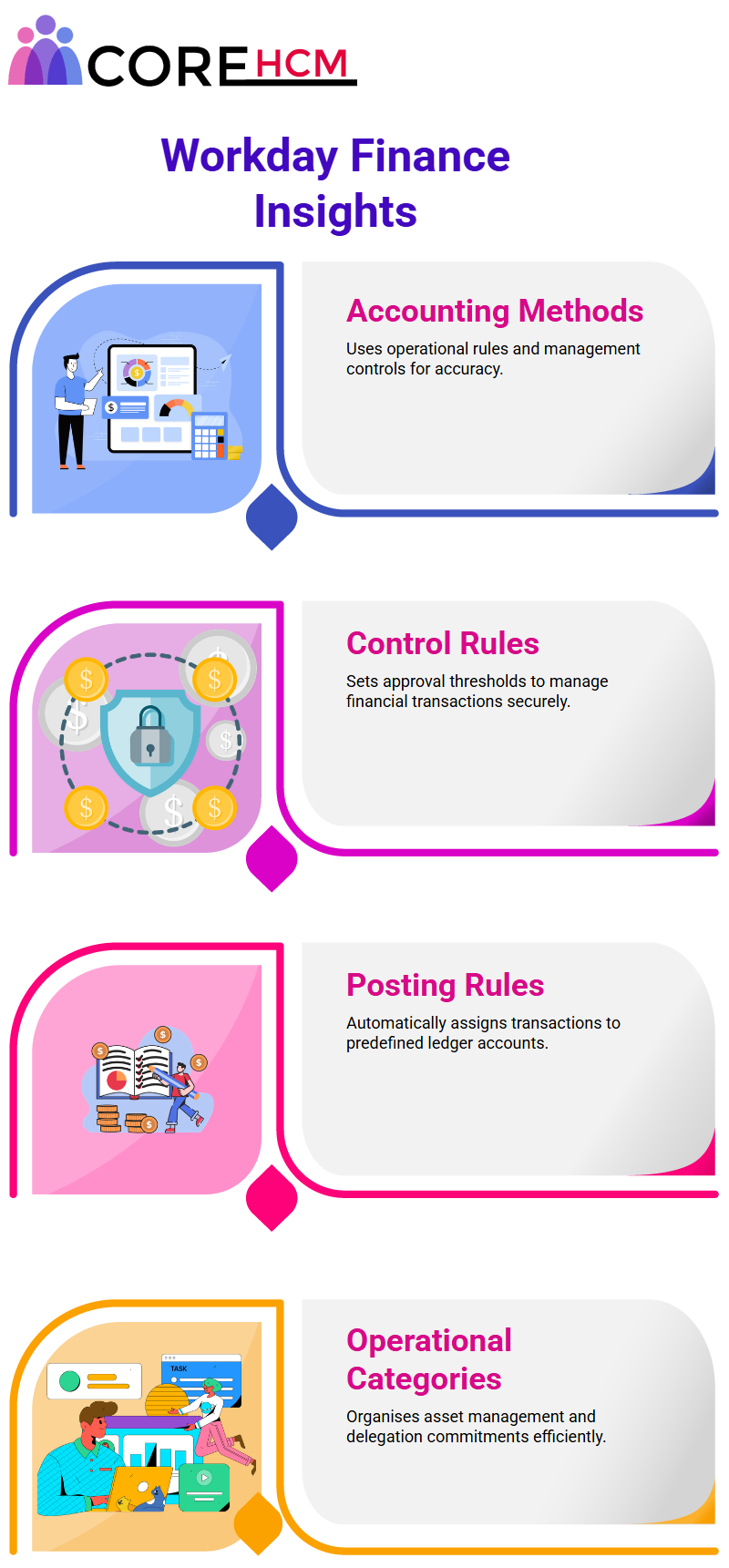
Revenue Posting Rules in Workday Finance
Let’s also touch on revenue posting rules within Workday Finance, where your income accounts truly excel.
These rules specify which accounts should be used to record sales, ensuring consistency and accuracy throughout the process.
Workday Finance uses these rules to categorise transactions accurately into their ledger accounts without error, truly revolutionising financial management as an art form.
Understanding Workday Finance Posting Rules
As Workday Finance users, we must comprehend how posting rules work.
Imagine your company processes transactions top to bottom in an ordered sequence.
The system evaluates each condition one at a time before searching for rows that meet our criteria.
If our criteria don’t find a match immediately, it moves on to the next one.
Workday Finance processes are impressively fast; after submitting a transaction, Workday Finance training in Hyderabad ensures that the system immediately analyses it and makes your account available almost instantly.
For example, if your company uses an SG entity with a revenue category of “subscription,” Workday automatically assigns this transaction to its related ledger account.
Otherwise, if no matching condition can be identified after reviewing all rows evaluated in turn, Workday assigns it to either the default ledger account or categorises it as an error bucket if neither option applies.
Workday Finance Operational Journals
Operational journals in Workday Finance are processed precisely and accurately.
If an operational journal falls into an error category due to mismatched conditions, you can run a task to fix all operational journals with errors.
This task ensures all transactions are accurately recorded.
Workday Finance Reversing Journals
Reversing journals is a core feature in Workday Finance.
One option, known as ‘Reverse Debits and Credits,’ switches the debit/credit amounts without altering ledger accounts.
For instance, if an original transaction debited $1,000 and credited $2,000.
The second option, “Keep Debits and Credits but Reverse Signs,” takes an unconventional approach.
Under this system, amounts remain in their original locations but their signs switch around, providing greater adaptability while maintaining accurate financial records.

